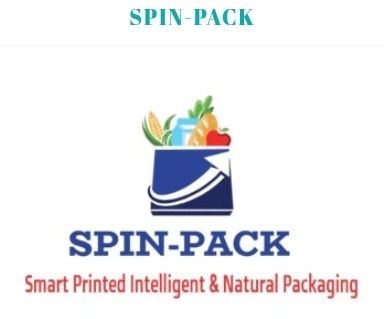- SPIN-PACK Innovations
- Responsive
- Posted by
Desired outcome
This challenge aims to develop and validate a lightweight, biodegradable, and scalable packaging solution for cold chain logistics. Instead of tackling the entire smart packaging system, teams will focus on either:
A. Developing a biodegradable insulation material to replace polystyrene in cold storage.
B. Embedding a simple, low-cost freshness or temperature indicator (e.g., color-changing ink, basic sensor integration).
Students will analyze feasibility, conduct small-scale testing, and propose scalable production ideas.
Initial Problem Description
Cold chain packaging is essential for food, pharmaceutical, and medical supply transport. However, existing solutions rely heavily on polystyrene foam (EPS) and plastic-based insulation materials, which:
✔️ Are non-biodegradable and contribute to waste pollution.
✔️ Lack recyclability, leading to high disposal costs.
✔️ Require energy-intensive production, increasing carbon footprint.
At the same time, cold chain monitoring is becoming more important for food safety & pharma compliance, yet most tracking solutions are expensive and not eco-friendly.
The challenge focuses on developing a packaging solution that is:
✔️ Biodegradable and compostable while offering thermal insulation.
✔️ Cost-effective and scalable for mass production.
✔️ Equipped with a simple freshness/temperature monitoring feature (e.g., color-changing ink, printed humidity sensors, RFID tags).
Student teams will explore novel materials, test insulation properties, and propose manufacturing approaches that enable real-world adoption.
Context
Why This Challenge Matters?
The global cold chain market is projected to reach over $500 billion by 2030, but its reliance on plastic-based packaging is unsustainable. Regulatory, environmental, and consumer demands are driving the need for eco-friendly, smart cold chain solutions.
Key Market Trends:
✔️ Regulatory Pressure:
EU Single-Use Plastics Ban & FDA sustainable packaging standards require biodegradable alternatives.
New food safety laws demand better real-time monitoring of transported goods.
✔️ Consumer & Industry Demand:
Companies are looking for eco-friendly packaging to avoid greenwashing claims.
Smart logistics solutions are needed to track temperature fluctuations in real-time.
✔️ Technology Innovation:
Bio-based insulation materials (e.g., mushroom packaging, bio-aerogels, cellulose foams) offer high thermal resistance.
Printed electronics & smart inks allow low-cost, real-time monitoring.
Use Cases:
Sustainable food packaging – Ensuring temperature stability for perishable goods.
Pharmaceutical transport – Meeting strict regulations for vaccine & medicine delivery.
Biomedical logistics – Protecting samples, blood samples, and lab reagents in storage etc.
Connection to cross-cutting areas
Circularity, General Sustainability, Industry 4.0, and digitalisation
✔️ Circular Economy & Sustainability – Eliminating plastic-based cold chain waste.
✔️ Industry 4.0 & IoT Logistics – Integrating low-cost smart tracking in eco-packaging.
✔️ General Sustainability & Climate Impact – Reducing the carbon footprint of packaging.
Input
We encourage students to explore:
1. Biodegradable Insulation & Structural Materials
✔️ Bio-Aerogels – Plant-derived insulation with high thermal resistance.
✔️ Mushroom/Mycelium-Based Packaging – Lightweight, compostable, and durable.
✔️ Cellulose-Based Foams – Renewable, water-resistant insulation.
✔️ Biodegradable Phase-Change Materials (PCM) – Temperature regulation for longer storage life.
2. Smart Monitoring & Real-Time Tracking
✔️ Color-Changing Freshness Indicators – pH-sensitive inks or coatings that react to spoilage.
✔️ Printed Temperature Sensors – Low-cost, flexible sensors to track temperature fluctuations.
✔️ Humidity-Responsive Smart Labels – Visual indicators for moisture changes.
✔️ NFC/RFID Smart Tags – Enabling real-time tracking & authentication.
3. Scalable, Cost-Effective Manufacturing Approaches
✔️ Hybrid 3D Printing + Injection Molding – Enabling custom designs for different logistics needs.
✔️ Roll-to-Roll Printed Electronics – Cost-efficient integration of smart monitoring.
✔️ Automated Bio-Coating Processes – Applying eco-friendly barrier layers to packaging.
Expectations
We expect student teams to work on as many areas below as possible:
✔️ A biodegradable cold chain packaging prototype OR feasibility study.
✔️ Simple smart monitoring feature (if applicable, e.g., color-change indicators).
✔️ Performance testing (small-scale thermal insulation analysis).
✔️ Sustainability impact report (end-of-life biodegradability, carbon footprint reduction).
✔️ Business feasibility analysis (production cost, scalability, potential industry adoption).
Deliverables include:
✔️ Concept Proposal – Material choice, design & expected performance.
✔️ Testing Report – Basic experimental validation of insulation or smart feature.
✔️ Market Feasibility Study – Potential adoption strategy, production cost analysis
Desired Team Profile
✔️ Materials Science & Chemistry – Biodegradable polymers, bio-based insulation.
✔️ IoT & Electronics Engineering – Smart sensors, NFC/RFID, printed electronics.
✔️ Sustainable Design & Manufacturing – 3D printing, scalable production techniques.
✔️ Business & Market Analysis – Supply chain logistics, cost modeling, regulatory compliance.
Additional Information
✔ Industry Collaboration: Mentorship & feedback from SPIN-PACK and logistics experts.
✔ Commercialization Potential and Job: Winning ideas may be developed into pilot projects and the team may be hired to work on Horizon EU supported projects
This challenge is a unique opportunity for students to drive sustainable innovation in packaging, integrating biodegradable materials and smart monitoring into cold chain logistics.
Are you ready to transform the way we store & transport temperature-sensitive goods?
Related Keywords
About SPIN-PACK Innovations
SPIN-PACK Innovations (JA k. 307119686) is an R&D-driven enterprise dedicated to next-generation sustainable packaging, advanced coatings & filaments, and eco-friendly filtration solutions. Our focus is on developing bio-based, biodegradable materials with smart functionalities, such as printed electronics, antimicrobial coatings, and intelligent tracking systems, to revolutionize the packaging, healthcare, and environmental sectors. Beyond packaging, SPIN-PACK is also innovating in high-performance coatings for barrier protection, antimicrobial resistance, and UV shielding, as well as biodegradable filters for air and water purification. By integrating additive manufacturing and advanced material engineering, we are in R&D of customized 3D-printed solutions, functional coatings, and smart filters that contribute to a circular economy and a greener future.

You need to sign up to apply to this challenge and submit a motivation letter!

Learn more about the topics and find team members!
Help
Need help submitting your proposal or have questions regarding this Open Innovation Challenge?
Contact support

